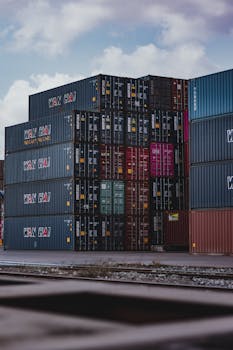
**
Oracle has unveiled a suite of new cloud services designed to transform trade and supply chain finance, promising enhanced efficiency, transparency, and resilience for businesses navigating increasingly complex global markets. This move positions Oracle as a major player in the rapidly evolving landscape of cloud-based supply chain management (SCM), digital supply chain, and trade finance technology. The new offerings leverage Oracle's robust cloud infrastructure and integrate seamlessly with existing ERP systems, offering a comprehensive solution for businesses of all sizes.
Streamlining Global Trade with Oracle's Cloud Solutions
The heart of Oracle's announcement centers around bolstering its already substantial cloud offerings with dedicated tools specifically targeted at streamlining trade and supply chain finance processes. These enhancements address key pain points experienced by businesses, including:
- Lack of Visibility: Traditional trade finance processes often lack transparency, leading to delays and inefficiencies. Oracle's new services aim to address this through real-time tracking and monitoring of transactions.
- Complex Documentation: The sheer volume of paperwork involved in international trade can be overwhelming. Oracle's cloud platform automates many of these processes, reducing manual effort and the risk of errors.
- Slow Payment Cycles: Delayed payments can significantly impact cash flow. The new services are designed to accelerate payment cycles and improve liquidity management.
- Security Concerns: Protecting sensitive financial data is paramount. Oracle's cloud infrastructure incorporates robust security measures to mitigate risks.
Oracle's Enhanced Trade Finance Capabilities: A Closer Look
The newly launched services are not merely incremental improvements but represent a significant leap forward in how businesses manage their global trade and supply chain finance operations. Key features include:
- Automated Trade Finance Processes: Oracle’s cloud platform automates document processing, payment initiation, and reconciliation, reducing manual intervention and accelerating transactions. This directly addresses the growing demand for automated trade finance solutions.
- Real-time Visibility and Tracking: Businesses gain unprecedented visibility into their trade operations, enabling them to proactively manage risks and optimize workflows. This enhanced transparency promotes supply chain visibility and enhances end-to-end supply chain management.
- Integrated Risk Management: The platform integrates risk management tools to identify and mitigate potential issues, minimizing financial exposure and operational disruption. This is crucial in a time of increasing geopolitical uncertainty and supply chain disruption.
- Improved Collaboration: The cloud-based platform facilitates seamless collaboration among buyers, sellers, banks, and other stakeholders, improving communication and accelerating transaction processing. This improvement in collaboration fosters supply chain resilience.
- Enhanced Regulatory Compliance: The services are designed to comply with international trade regulations and industry best practices, reducing compliance burdens. This is a crucial aspect in light of increasing global trade regulations.
Benefits for Businesses of All Sizes
These new cloud services offer significant benefits to companies of all sizes, from small and medium-sized enterprises (SMEs) to large multinational corporations. SMEs can leverage the platform's scalability and affordability to access sophisticated trade finance capabilities that were previously out of reach. Larger corporations can benefit from improved efficiency, reduced costs, and enhanced risk management.
The Impact on the Broader Supply Chain Landscape
Oracle's investment in this area signals a major trend in the supply chain sector – the increasing adoption of cloud-based solutions to enhance efficiency, transparency, and resilience. This move places Oracle in a strong competitive position in the rapidly expanding market for cloud-based supply chain finance solutions.
The integration of advanced analytics and AI capabilities within the platform also indicates a shift towards more data-driven decision-making within supply chain management. Businesses can leverage real-time data insights to optimize inventory management, improve forecasting accuracy, and proactively respond to market changes. This move towards AI-powered supply chain optimization is a game-changer for the industry.
Addressing Key Challenges in Global Trade
The current global economic landscape presents numerous challenges for businesses engaged in international trade, including:
- Geopolitical Uncertainty: Trade tensions and global conflicts can disrupt supply chains and impact business operations. Oracle's new services provide the tools necessary to navigate these uncertain times.
- Supply Chain Disruptions: Unexpected events such as natural disasters or pandemics can severely impact supply chains. Real-time visibility and robust risk management capabilities are crucial for resilience.
- Increased Regulatory Complexity: Navigating complex trade regulations can be challenging. Oracle's platform helps businesses comply with relevant regulations and avoid potential penalties.
Oracle's new services directly address these challenges by providing businesses with the tools and technology necessary to improve visibility, enhance resilience, and navigate an increasingly complex global trade environment.
The Future of Trade and Supply Chain Finance: A Cloud-First Approach
Oracle's commitment to investing heavily in its cloud-based trade and supply chain finance offerings clearly signals a significant shift within the industry. The future of trade finance will undoubtedly be characterized by greater automation, enhanced transparency, and increased reliance on data-driven decision-making. Companies that embrace these cloud-based solutions will be best positioned to thrive in the increasingly competitive global marketplace. The integration of advanced technologies such as blockchain technology for supply chain, and the use of predictive analytics in supply chain, is also anticipated to further shape the future of the industry. Oracle's move places it at the forefront of this transformation.




















